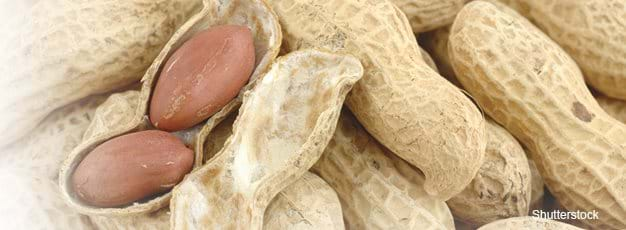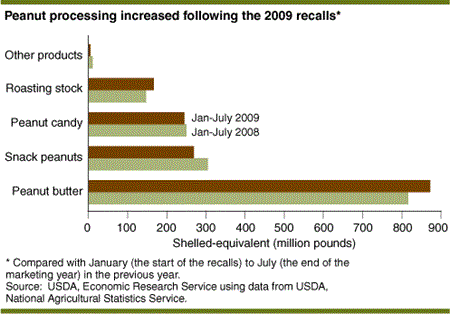Peanut Processing and Sales Hold Steady After Peanut-Product Recalls

One of the largest food safety recalls in U.S. history occurred in early 2009 with the removal of thousands of food products containing peanut ingredients potentially contaminated with Salmonella. The source of the contaminated ingredients was traced back to one supplier handling less than 2 percent of the U.S. peanut supply.
The scope of the recall was magnified because the peanut products were used as ingredients in nearly 4,000 products manufactured by about 200 companies. Most recalled products contained peanut paste or peanut butter, such as cakes, candy, cookies, peanut crackers, and ice cream. Others contained blanched, granulated, and roasted peanuts, including pet food products and a variety of snack mixes. Some recalled products were produced in bulk and sold directly to institutions for use or repackaging.
Retail scanner data indicate that consumers temporarily reduced purchases of peanut-containing products in the first 2 months after the recalls began in January 2009, but by April 2009, consumer purchases exceeded the previous year’s levels.
Despite the temporary dip in retail sales, the recalls have not stemmed overall growth for peanut products. One indicator of anticipated retail demand for peanut products is peanut-processing activity, which reflects orders from food manufacturers and retailers. Monthly processing volumes indicate that demand remained largely unchanged from, or even higher than, the previous 3 years. Peanut butter processing increased 9 percent from 2008, possibly because major brands of peanut butter were not recalled. Other categories of peanut use (e.g., peanut candy, snacks) did decline, but the total volume of peanuts processed during the August 2008-July 2009 peanut marketing year still increased 1.5 percent from the previous year.
The growth of peanut processing and use was sustained by several factors. An unexpectedly large harvest in 2008 increased peanut stocks, and the abundant supplies may have created incentives for additional processing. In addition, peanut products, such as peanut butter, are often cited as “recession-proof.” Limited evidence does suggest that peanuts fit into the category of goods—so called “inferior goods”—for which consumption tends to increase as incomes decline and decrease as incomes grow. Consequently, the recent recession may have supported peanut consumption.
Peanut Outlook: Impacts of the 2008-09 Foodborne Illness Outbreak Linked to Salmonella in Peanuts, by Kelsey Wittenberger and Erik Dohlman, USDA, Economic Research Service, February 2010


